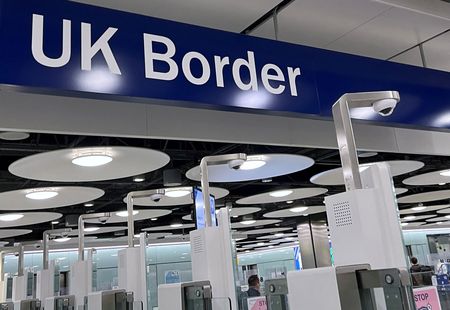By William James
LONDON (Reuters) -Long-term net migration to Britain fell by 50% in 2024, official data showed on Thursday, as fewer people arrived on work and study visas following rule changes to cut the number of arrivals.
Net migration – an estimate of the number of people migrating to Britain minus those leaving – dropped to 431,000 from 860,000 in 2023, the Office for National Statistics said.
The data will offer some relief to Labour Prime Minister Keir Starmer, who earlier in May promised to reduce migration significantly over the next four years, under pressure from Nigel Farage’s right-wing, anti-immigration Reform UK party.
Starmer became prime minister in July 2024. The Conservative Party, in government prior to Starmer’s election, said the decrease reflected changes to visa rules they brought in.
The government welcomed the drop and said changes announced earlier this month would drive net migration even lower.
The ONS said the change was driven by lower immigration from countries outside the European Union, Norway, Iceland, Liechtenstein and Switzerland. In recent years this category has included high numbers of people from India, Nigeria and Pakistan.
“We are seeing reductions in people arriving on work- and study-related visas, and an increase in emigration over the 12 months to December 2024,” the ONS said in a statement.
It noted that international students who came to Britain in large numbers when COVID pandemic travel restrictions were lifted were now leaving the country as their visas expired.
Data released by the ONS last year showed net migration reached a record high of 906,000 in the year to June 2023.
Anger over immigration – by both legal and illegal means – has dominated Britain’s political agenda for more than a decade, driving its vote to leave the EU in 2016 and pushing successive governments to find new ways to cut the numbers.
Nevertheless, with an ageing population and skills shortages across the economy, Britain’s economy still relies heavily upon migrant workers.
In March, Britain’s budget forecasters cited an expected slowdown in net migration as a factor driving a reduction in its economic growth forecast for 2025.
Thursday’s data showed a 49% fall in immigration for work and a decrease of 17% in those seeking to study. The number of dependents from both categories also dropped sharply.
In 2023, the Conservative government raised the minimum salary threshold for foreign skilled workers and made it harder for workers and students to bring their families with them.
(Reporting by William James; editing by Sam Tabahriti, Sarah Young, Alexandra Hudson)









